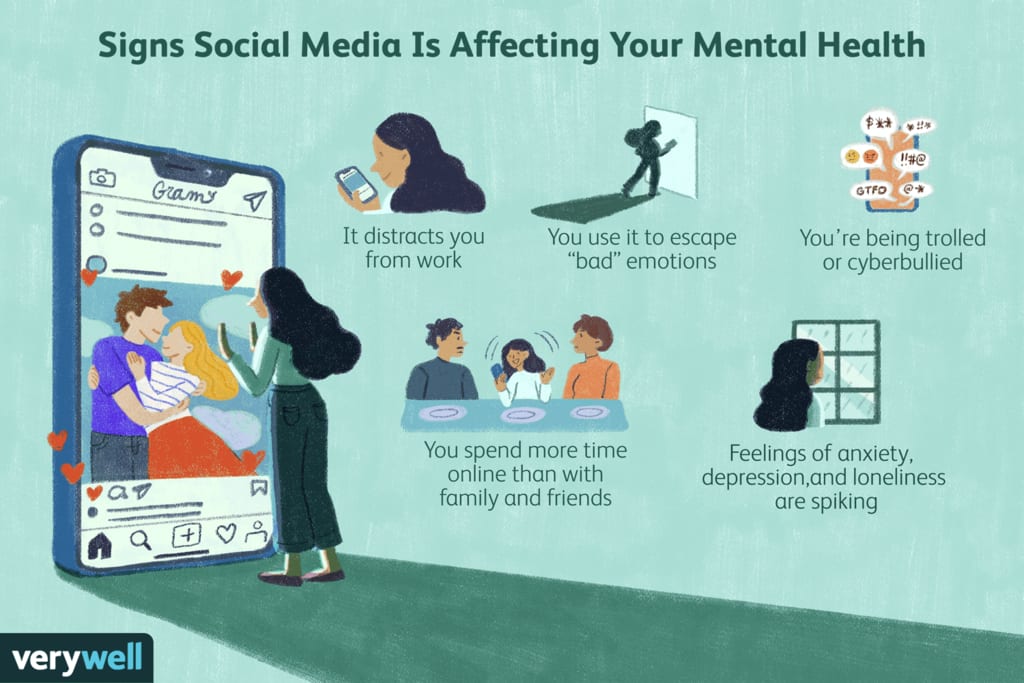Social media And Mental Health
The effect of social media on mental health

Keywords: social media, mental health, anxiety, depression, cyberbullying, addiction, self-esteem, well-being
Abstract:
The use of social media has become ubiquitous in today's society, and its impact on mental health has become a topic of interest in the academic community. This article examines the effect of social media on mental health, specifically focusing on anxiety, depression, cyberbullying, addiction, self-esteem, and well-being. The literature review found that social media use can have both positive and negative effects on mental health. While it can provide social support, facilitate communication, and enhance well-being, it can also contribute to feelings of anxiety, depression, cyberbullying, addiction, and low self-esteem. Additionally, social media use has been linked to negative comparisons with others, leading to feelings of inadequacy and a decline in overall well-being.
Introduction:
Social media platforms have become an integral part of our daily lives. They allow us to connect with friends and family, stay up-to-date with current events, and share our thoughts and experiences with a wider audience. While social media has many benefits, there is growing concern about its impact on mental health. This article aims to provide an overview of the current research on the effect of social media on mental health, specifically focusing on anxiety, depression, cyberbullying, addiction, self-esteem, and well-being.
Anxiety and Depression:
Studies have shown that social media use can contribute to feelings of anxiety and depression. One study found that social media use was positively associated with depression symptoms, especially in those who used social media for more than two hours per day (Lin, Zhou, & Li, 2017). Another study found that social media use was associated with higher levels of anxiety and lower levels of well-being (Hunt, Marx, Lipson, & Young, 2018). Social media can contribute to these negative outcomes by creating a platform for social comparison, leading to feelings of inadequacy and low self-esteem.
Cyberbullying:
Cyberbullying is another concern associated with social media use. Cyberbullying refers to the use of electronic communication to harass, intimidate, or harm others. Research has shown that cyberbullying is a growing problem, with many young people experiencing online harassment (Kowalski, Giumetti, Schroeder, & Lattanner, 2014). Social media platforms can provide a platform for cyberbullying, making it easier for bullies to target their victims.
Addiction:
Social media addiction is a growing concern, with many individuals reporting difficulty disconnecting from social media. One study found that individuals who used social media frequently were more likely to report addiction-like symptoms, such as loss of control and withdrawal symptoms (Andreassen et al., 2017). Social media addiction can have negative effects on mental health, including decreased well-being and increased feelings of anxiety and depression.
Self-Esteem:
Social media use can also contribute to feelings of low self-esteem. Social media platforms often provide a platform for social comparison, leading to feelings of inadequacy and low self-worth (Vogel, Rose, Roberts, & Eckles, 2014). Additionally, social media can create pressure to present an idealized version of oneself, leading to feelings of inauthenticity and disconnection from others.
Well-Being:
While social media use can have negative effects on mental health, it can also have positive effects. Social media platforms can provide a platform for social support and facilitate communication with others. Additionally, social media use has been associated with increased well-being in some studies (Shakya & Christakis, 2017). However, it is important to note that the relationship between social media use and well-being





Comments
There are no comments for this story
Be the first to respond and start the conversation.